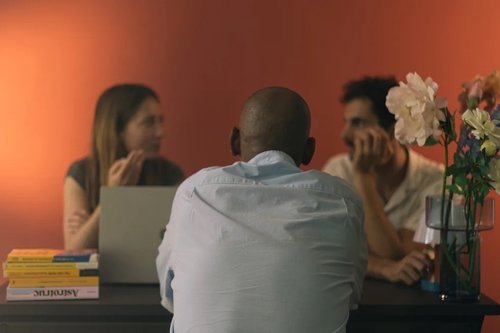Can you say ‘I don’t know’ during a job interview?
Jun 10, 2021
5 mins


Journaliste indépendante.
By some accounts, Abraham Lincoln once said, “Better to remain silent and be thought a fool than to speak and remove all doubt.” Those are words of wisdom, regardless of who said them first, but do they apply in a job interview too? Should you really keep quiet? Or should you admit you don’t know the answer when asked a question, rather than scrambling to come up with something just so that you give an answer?
Once you’ve got the post, acknowledging that you don’t know about a subject is rarely a problem. But in a job interview, a candidate has a short amount of time to convince the interviewer of their knowledge and skills. So can you “truly” admit that you don’t have the answer to the question that you’ve been asked?
Will it count against you if you don’t know something?
If it hasn’t already happened to you, it will. Everyone, one day or another, will be faced with a question to which they don’t know the answer. Luckily, it’s rarely a big deal. How much the recruiter tolerates it will mostly depend on the type of question you’re unable to answer.
- The classic questions
Preparing properly for job interview questions is essential. Not many recruiters will take you seriously if you are overly modest about answering such prompts as: “Tell us about yourself” or “Tell us about your most recent experience”. At the same time, however, stress can sometimes cause you to forget what you know. In this case, most recruiters will be forgiving and will give you some time to collect your thoughts.
- Basic questions about the core business
Are you allowed to not know the four Ps of marketing when applying for a job in that field? Well, that depends. “If a person doesn’t know the answer to a relatively simple question about their professional area, even after being given some time to think, this can be damaging. But this type of situation is rare,” said Ruth Cimpoy, a recruiter in a consulting firm. Most often, the candidate has some knowledge, but they simply don’t know enough. If this is the case, Cimpoy recommends showing your desire to progress. “For example, you can answer that you are aware that your level of knowledge of the subject is not up to their expectations, but that you are ready to work on it in such and such a way,” she said.
- Complex questions
Maxime Thomas, the co-founder of a training firm, likes to pose hard questions. “I like to ask questions like, ‘If you had all you needed to carry out this project, how would you go about it?’ I’m aware that it’s a difficult question, but I’m not expecting the right answer, I’m simply looking to understand the candidate’s reasoning,” he said. There’s rarely a “wrong answer” that could work against you. Another approach is to compensate for your lack of knowledge by highlighting your curiosity, your humility, and your capacity to listen. You could say: “I admit that I don’t know, but could you explain how it works?” Acknowledging that you don’t know is a form of wisdom and insight. Plato would be proud of you.
- Trick questions
A recruiter may deliberately seek to surprise you with an odd question such as: “How many tubes of glue would you need to build this model?” This often happens in interviews for consulting firms. The objective is rarely to see if you know the answer but to see how you react under pressure.
Can you lie if you don’t know?
It may be tempting to “bullshit” if you think the recruiter won’t be able to verify your answer or make an educated guess in the hopes of making a good impression. Unfortunately, it’s dangerous to try lying to cover up your ignorance. “During my early recruiting days, I dealt with a person who lied rather than tell me they didn’t know about a key subject. It was my fault, I should have dug deeper rather than taking them at their word. In the end, I had to fire them after several weeks because they didn’t know how to do what they had been hired to do,” said Thomas. Lying creates a time bomb.
Inventing or bullshitting an answer shows your weakness and your unreliability. Nobody wants to work with someone who hides their ignorance as this could have an impact on projects or colleagues. “On the contrary, it’s a very good sign when a person acknowledges not knowing something,” said Thomas. “Because there is every chance that the person will react in the same way once they are on the job––and that is exactly what I expect from my employees: honesty and transparency.”
Five tips to help you to react well when you don’t have the answer
Don’t panic!
Can you feel a giant drop of sweat pooling on your temple? Whenever you’re faced with a question you don’t have the answer to, try to keep your cool and breathe deeply. Don’t be afraid of silence. Staying calm shows the recruiter that you are able to handle the pressure.Stall
If you have a vague idea of the answer but you’re not able to articulate it, try to buy some time by asking them to rephrase the question or to clarify some aspect of it. This will give your brain some time to put the puzzle pieces together.Look for clues
Asking related questions may give you a better understanding of what the recruiter is looking for from you. Probe the topic to see if you can get more details that will help you to understand it. If a recruiter asks you about the best way to approach a specific project, you can say, “To help me give you a more appropriate answer, can you tell me how the company has been carrying this out so far?”Think it through out loud
When a recruiter asks a deliberately complex question, it’s usually because they want to gain insight into how you solve problems. If they ask about how you would set up a project but don’t have a concrete idea of the end result, simply explain the steps you would take: “To start, I would go out and interview the client, and then I think it’s important to…” Often the thought process is more important than the answer itself.Answer…later
When dealing with a complex question, don’t be afraid to commit to answering it later: “This is a question worth thinking about. I can answer it in part, but I’d like to think about it and give you a more complete answer later.” The “later” can be at the end of the interview or in your follow-up email. This is a great way to show dedication and how serious you are and it will probably make you stand out more than if you try to avoid answering the question.
Your mindset during an interview is your best ingredient for success. You don’t have to be perfect to get a job. Not having the answer to a question is rarely detrimental, while trying to get away with a lie will turn your application into a time bomb. “An interview is not an exam. It is, above all, an exchange,” said Cimoy.
So, can you say “I don’t know”? Hmm… hard to say… Could you rephrase the question?
Translated by Kalin Linsberg
Photo: Welcome to the Jungle
Follow Welcome to the Jungle on Facebook, LinkedIn, and Instagram, and subscribe to our newsletter to get our latest articles every day!

More inspiration: Ace your job interview

Why are you leaving your job? Here's how to nail the answer
Caught off guard by 'Why are you leaving your job?' Here's how to flip this tricky question into a spotlight on your goals and potential.
Dec 24, 2024

Standing out in an interview: Creative responses to common questions
Answering common interviews with common responses isn't going to get you far in today's job market. Here's how to truly stand out!
Nov 26, 2024

The Pratfall Effect: Can screwing up in a job interview make you more likable?
Mistakes you make in a job interview could actually work to your advantage ...
Oct 14, 2024

How to bring up your long-term career goals in an interview
Be honest but strategic. The key is aligning your goals with the role while showing flexibility and ambition. Avoid faking it!
Sep 24, 2024

Is honesty the key to discussing your weaknesses?
Are your weaknesses holding you back in an interview? A bit of honesty can flip the script and make your flaws work in your favor.
Aug 21, 2024
The newsletter that does the job
Want to keep up with the latest articles? Twice a week you can receive stories, jobs, and tips in your inbox.

Looking for your next job?
Over 200,000 people have found a job with Welcome to the Jungle.
Explore jobs